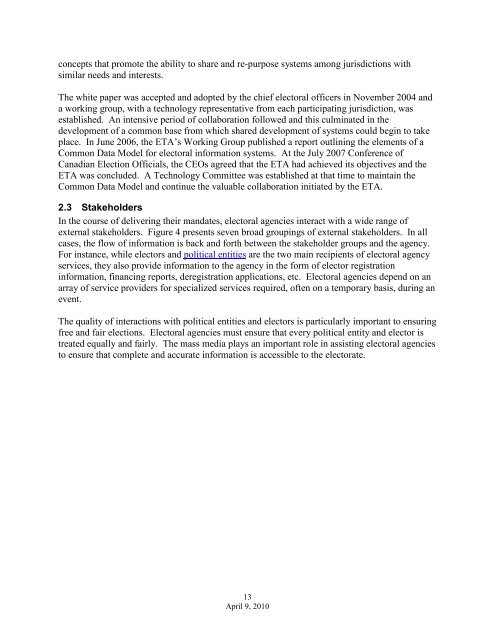Electoral-Management-Reference-Model-v.1.0
Electoral-Management-Reference-Model-v.1.0
Electoral-Management-Reference-Model-v.1.0
Create successful ePaper yourself
Turn your PDF publications into a flip-book with our unique Google optimized e-Paper software.
concepts that promote the ability to share and re-purpose systems among jurisdictions with<br />
similar needs and interests.<br />
The white paper was accepted and adopted by the chief electoral officers in November 2004 and<br />
a working group, with a technology representative from each participating jurisdiction, was<br />
established. An intensive period of collaboration followed and this culminated in the<br />
development of a common base from which shared development of systems could begin to take<br />
place. In June 2006, the ETA’s Working Group published a report outlining the elements of a<br />
Common Data <strong>Model</strong> for electoral information systems. At the July 2007 Conference of<br />
Canadian Election Officials, the CEOs agreed that the ETA had achieved its objectives and the<br />
ETA was concluded. A Technology Committee was established at that time to maintain the<br />
Common Data <strong>Model</strong> and continue the valuable collaboration initiated by the ETA.<br />
2.3 Stakeholders<br />
In the course of delivering their mandates, electoral agencies interact with a wide range of<br />
external stakeholders. Figure 4 presents seven broad groupings of external stakeholders. In all<br />
cases, the flow of information is back and forth between the stakeholder groups and the agency.<br />
For instance, while electors and political entities are the two main recipients of electoral agency<br />
services, they also provide information to the agency in the form of elector registration<br />
information, financing reports, deregistration applications, etc. <strong>Electoral</strong> agencies depend on an<br />
array of service providers for specialized services required, often on a temporary basis, during an<br />
event.<br />
The quality of interactions with political entities and electors is particularly important to ensuring<br />
free and fair elections. <strong>Electoral</strong> agencies must ensure that every political entity and elector is<br />
treated equally and fairly. The mass media plays an important role in assisting electoral agencies<br />
to ensure that complete and accurate information is accessible to the electorate.<br />
13<br />
April 9, 2010


